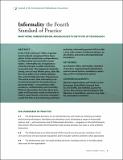| dc.contributor.author | Rowe, Mary | |
| dc.date.accessioned | 2024-10-04T21:12:23Z | |
| dc.date.available | 2024-10-04T21:12:23Z | |
| dc.date.issued | 2012 | |
| dc.identifier.uri | https://hdl.handle.net/1721.1/157129 | |
| dc.description.abstract | In the 1970s and early 1980s, organizational ombuds recognized three basic pillars of their profession: independence,
confidentiality and neutrality (impartiality). Informality was recognized as a fourth principle, or pillar of practice, somewhat later. This happened relatively slowly, over at least fifteen years, after the first three pillars were widely adopted. This article briefly describes that process. The article asserts that informality is an essential principle for the profession as practiced today—as essential as independence, confidentiality and neutrality. Without informality, the other three principles of OO practice could not function in today’s legal climate, and many managers would find OOs to be interfering with their authority. Informality permits OOs to offer a very wide variety of informal options, to all cohorts, and across all organizational boundaries. | en_US |
| dc.language.iso | en_US | en_US |
| dc.publisher | Journal of the International Ombudsman Association | en_US |
| dc.subject | zero-barrier office, informality, standard of practice, organizational ombudsman, interest-based option, mandatory reporting, conflict management system | en_US |
| dc.title | Informality, the Fourth Standard of Practice | en_US |
| dc.type | Article | en_US |
| dc.identifier.citation | Mary Rowe, “Informality, the Fourth Standard of Practice,” Journal of the International Ombudsman Association Vol. 5, No. 1 (Winter 2012): 8-17. | en_US |
